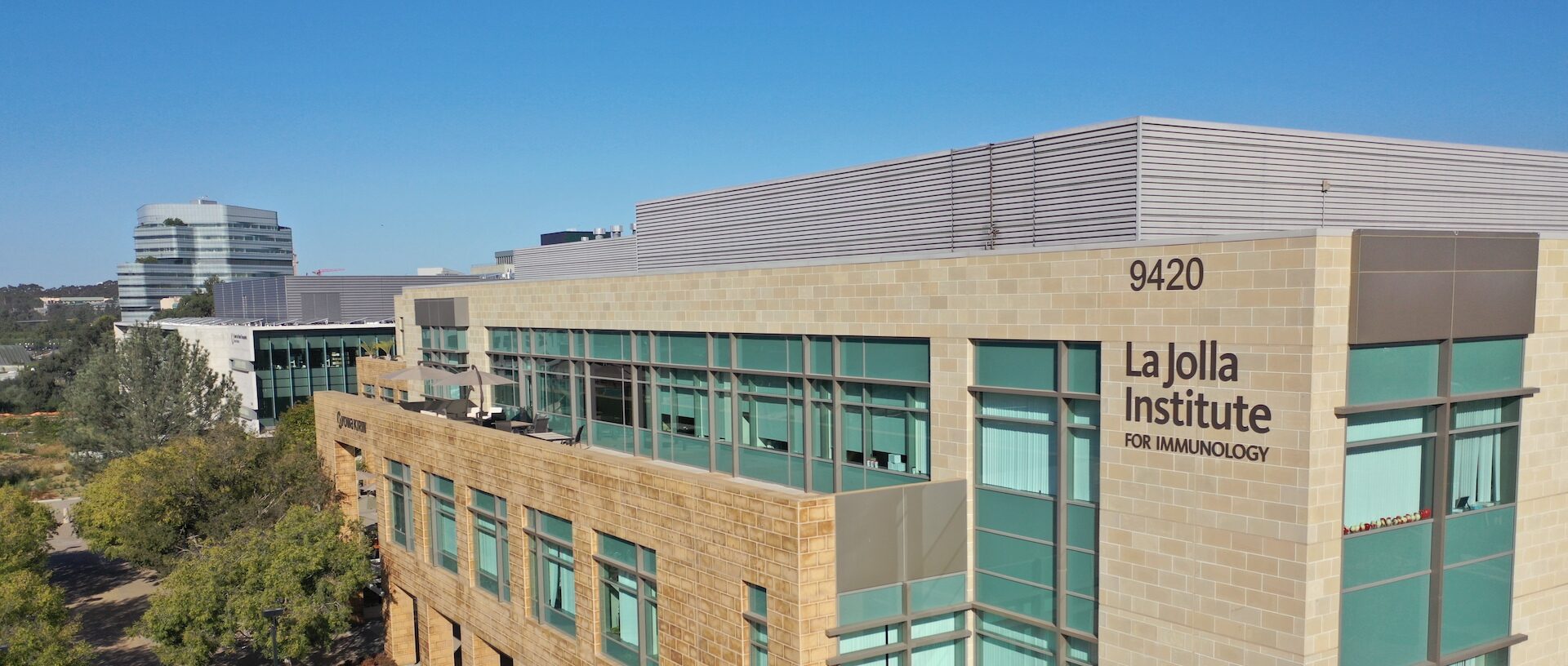Rarely in view of the general public, a small but unique group of La Jolla Institute employees works passionately to help advance some of the most groundbreaking immunology research in the world. Most are not classically trained scientists but it is their joint effort that creates the robust support infrastructure that is so critical to the Institute’s scientific success.
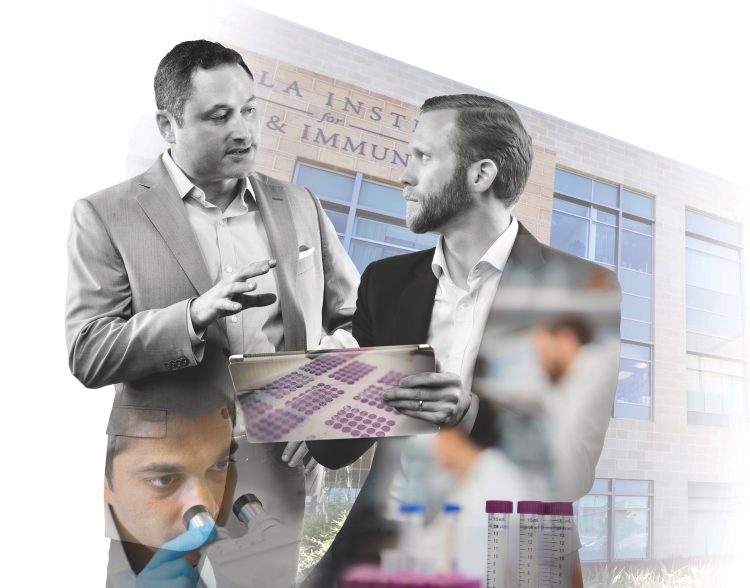

Though “outside the lab,” the scientific support staff’s deep pride and commitment to helping unravel the mysteries of the immune system parallels that of their scientific colleagues. Their contributions range far and wide: from helping attract millions in government grants, securing the most sophisticated scientific equipment, safeguarding vast amounts of data, protecting the health and safety of both staff and animals, stewarding intellectual property, fundraising, and communicating the Institute’s discoveries to the world, to mention just a fraction of the important functions that propel La Jolla Institute’s mission (see stories on pages 6 to 12).
“To some, biomedical research may seem as simple as a brilliant mind going into a lab with a hypothesis and in a solo effort attempting experiments that will hopefully uncover the secrets of nature,” says Mitchell Kronenberg, Ph.D., Institute President and Chief Scientific Officer. “That will always be the foundation, but in today’s modern world, most people are unaware that science has become an incredibly complex social enterprise. The principal investigators and their research teams are just the leading edge of a massive effort that includes large numbers of non-scientific personnel whose support is fundamental to the scientists’ ability to achieve true discovery.”
The person who oversees this effort is immunologist Stephen Wilson, Ph.D., and as Executive Vice President and Chief Operating Officer, he and his team approach scientific support as an opportunity to partner with labs, not just administer from afar. “We’re fortunate to have such a clear and admirable mandate: empower scientific staff with cutting-edge technology and expertise so that their research environment has the fewest possible barriers to discovery,” says Dr. Wilson. “While we constantly search for ways to improve, it’s our belief that from a scientist’s perspective, LJI is among the most streamlined and effective institutes in the world.”
Facilities and financial support aside, the biggest factor helping the Institute stand apart: the individuals providing scientific support. Highly trained professionals with a passionate interest in science and discovery, they are dedicated to facilitating research and smoothing the road to discovery. Although not scientists themselves, they carry out critical jobs within a heavily regulated business environment and are held to the highest standards.
“We take our mission very seriously, and every day, together, we’re fighting the clock,” says Dr. Wilson. “So, when we boil it down, everything our support staff does has to be with the intent of making life easier for our scientists to remain focused and effective, saving them that most precious of commodities, time.”
“Can a researcher conduct science with just a lab, some lab technicians and some tissue and no other support?” asks Principal Investigator Sonia Sharma, Ph.D., Assistant Professor and Director of the Functional Genomics Center. “I will always say ‘yes’, but if the question is whether that same researcher can produce great science, and in high quantities without support, the answer is ‘absolutely not.’”
Dr. Sharma says that in today’s environment, the pursuit of science is so complex, competitive, and technological, researchers would simply be overwhelmed and their research productivity and quality would suffer tremendously without support. Having worked at several other scientific organizations, she says the Institute is far and away the best at providing that support.
“La Jolla Institute is truly unique,” Dr. Sharma said. “I think I speak for just about all of the research staff here at the Institute when I say that top to bottom our support staff are stellar. I don’t think there’s any question they’ve played a crucial role in both the volume and quality of the research my lab has been able to conduct. They really do help us become better scientists.”

Albin Soares, MBA
Director of Research Administration
In every successful organization you’ll find “go-to” people—those to whom others turn to help get things sorted out. As the Institute’s Director of Research Administration, Albin Soares is the epitome of that person: smart, highly motivated, and amazingly resourceful.
When Soares recently listened to Principal Investigator Sujan Shresta, Ph.D., ask whether her lab had the finances to add both a postdoc and some new equipment, he knew it would overburden her lab in the short-term.
“Dr. Shresta wanted to hire a postdoc from Nepal to help expand her human study efforts, but she also needed to replace a failing -80 degree freezer and a six-foot lab hood. I recommended that she use available funds to hire the postdoc, and that we would beg, borrow, and steal for the equipment. In the end, Dr. Shresta was able to accomplish all three.”
Soares engages in that kind of problem solving virtually every day as he serves as the Institute’s key administrative liaison with the scientists. Just to name a few of his duties: He is responsible for the financial success of scientists’ portfolio of grants and contracts; advises the PIs on the impact of personnel decisions and equipment acquisition; helps them create financial plans for operating their labs and drafts strategic plans for future expansion; supervises all the labs’ administrative assistants; informally serves as administrative support for the joint LJI-UC San Diego immunology program, and as the Institute’s government relations specialist, conducts Institute tours for members of Congress and other state and local elected leaders.
Soares’ education and professional experience, along with his passion for the Institute’s scientific mission, made him well suited for the dynamic job when he was hired three years ago. He has a B.A. from George Washington University, an MBA from Tulane University, has worked for a U.S. congressman on Capitol Hill, served as a consultant to the Office of Management and Budget, and has worked in private businesses ranging from startups to Fortune 500 companies.
“Our scientists are brilliant when it comes to their research. But they are not formally trained in business, and that can put them at a disadvantage in running their labs, which are essentially enterprise operations experiencing many of the same issues facing small businesses,” Soares says. “I do wear a lot of hats in this job, but I really like what I do because I enjoy seeing just how much of a positive impact I can have in helping the labs. If I can free up even 10 percent of the principal investigators’ bandwidth, that translates into 10 percent more of their time that can be focused on science.”
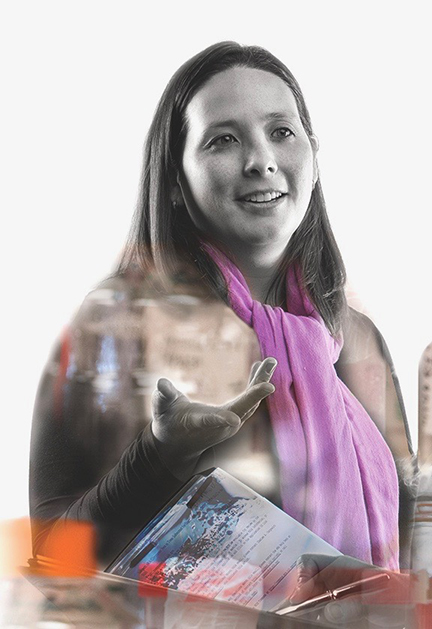
Margaret Ng Thow Hing, J.D.
Senior Director, Technology Development
There’s nothing more thrilling at La Jolla Institute than those moments when research leads to a groundbreaking scientific discovery that may help to understand the cause or to treat a disease. Once the excitement and celebration have subsided, however, two questions emerge: First, is there an application in industry for this technology and, second, is there any novel intellectual property that should be protected?
Intellectual property protection is a critical step in translating discoveries into actual drugs and therapies and, in the process, generating commercial research funding, licensing fees, and royalties for the Institute.
The many complexities and details of the discovery protection process at the Institute are handled by the highly skilled team in the Technology Development department, led by Patrick Ho, J.D., Vice President and Chief Business Officer. The department members, each of whom is a legal specialist, a trained scientist, or both, all share a love of science and truly enjoy the process of helping protect the Institute’s key discoveries.
Senior Director Margaret Ng Thow Hing is a perfect example. She has both a J.D. and a master’s degree in molecular genetics from the University of Toronto, and calls on both disciplines daily in working with scientists.
“One of our key responsibilities is to make sure the Institute’s discoveries are protected with patents and other legal safe-guards, and that’s a process we work on with the scientists, often at a very early stage in the research,” Hing says. “As a scientist, I love the opportunity to observe all kinds of outstanding research evolve and come to fruition, and as a lawyer, I enjoy employing my legal skills to make sure those discoveries are properly protected.” In addition to putting
the proper intellectual property protections in place, Hing works closely with members of the department responsible for business development functions to identify commercial applications for the technology and develop strategies to move the discovery out of the research lab and into industry.
As complicated and time consuming as the above process is, however, it represents only a fraction of the services Hing and her colleagues provide. They draft the contracts necessary to acquire compounds and technical tools the scientists use in their labs. They manage the necessary legal framework for the Institute’s many relationships with corporate partners and other scientific institutions. They write the agreements that allow the Institute to license research discoveries to pharmaceutical companies for drug development or contract with companies to conduct research on compounds they provide.
“One reason our department is so committed to doing the best job we can is because these corporate partnerships and contracted research agreements are not only important for advancing science, they’re also critical to the Institute financially,” Hing says.
As busy as she is, Hing says she will never regret her decision to leave private intellectual property law in 2011 and join the Institute. “I feel particularly lucky to be working here,” she says. “It may sound hokey, but I really believe this is a very special place with amazingly talented scientists and staff. I realize I’m not the person generating the science, but I’m completely invested in the success of our researchers and the Institute. I get excited when there is a new discovery and I have the opportunity to contribute to a process that enables great science to emerge from the lab and be delivered out into the world to benefit public health.”
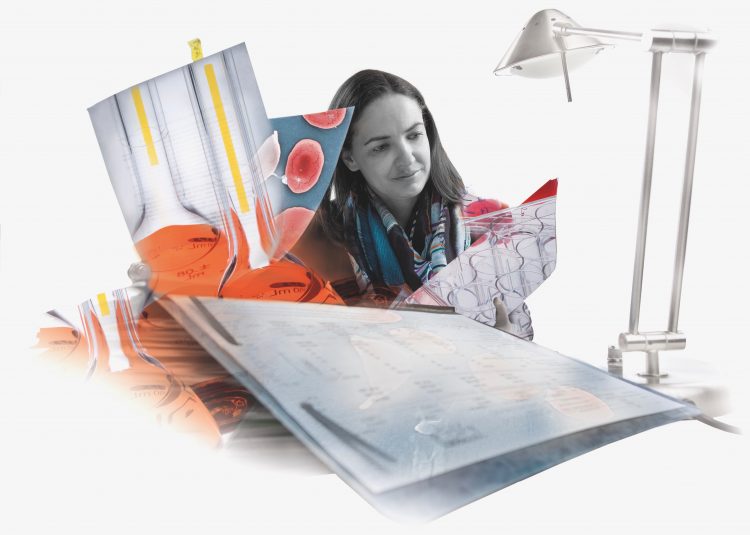
Lisa Young, CIP
Senior Compliance Administrator
When asked about the intellectual thrill of being a scientist, one topic never comes up: navigating a maze of research regulations designed to safeguard research integrity and protect the physical wellbeing of scientists and research subjects alike.
That’s where Lisa Young, a 14-year veteran of the Institute, comes into play. A senior compliance administrator with a bachelor’s in science from National University of Ireland, Young administers three separate internal committees that oversee biosafety, lab animal welfare, and human subjects research. She sees herself as a guide and facilitator, who educates researchers and helps scientists comply with the regulatory requirements surrounding their research. “The work our faculty does carries with it a great deal of responsibility and, as a result, a great deal of paperwork,” she explains. “We strive to make the oversight process as efficient as possible, so that our researchers can return their focus to what’s most important to them and that’s investigating the immune system.”
In many cases, before any actual research takes place at the bench, the proposed project has to be reviewed by the appropriate committee to ensure it meets all internal safety standards, complies with federal, state, and local regulations, and is designed in accordance with the highest ethical principles. The committees include LJI scientists, independent outside scientists, subject matter experts as well as members of the general public. Young works with these diverse groups of members to help the committees operate smoothly and with researchers to facilitate submission of research proposals. She confirms the correct forms are filled out, coordinates the submission and review process, and generally lends a helping and reassuring hand.
As part of their research, scientists routinely handle laboratory mice, pathogens, potentially hazardous chemicals, and human blood samples from clinical research volunteers. Add in that all of this is subject to massive amounts of government regulation and oversight and it is easy to understand why some researchers may feel burdened by all the rules and regulations governing their work.
“It can be logistically challenging to ensure that all of our research complies with all applicable regulations given the wide scope and nature of immunology research conducted here,” says Young, who started her career at LJI at a laboratory bench and thus is intimately familiar with the day-to-day operation of an active research lab. “But the Institute has an elaborate infrastructure in place to address all of the logistics and we strive to make the process as efficient as possible. For me, it is very rewarding to be part of the team supporting our researchers in the great work they do.”
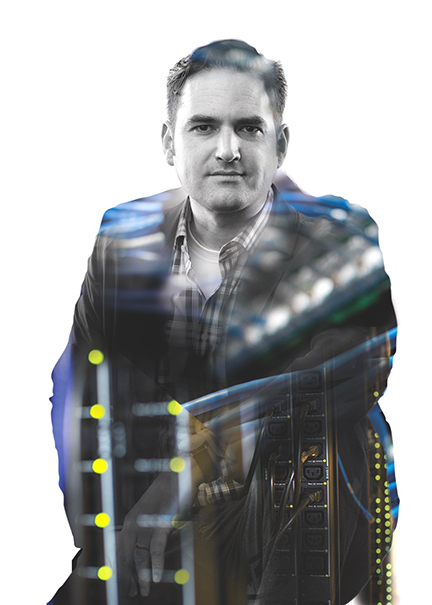
John Stillwagen, MBA
Director of Management Systems
La Jolla Institute has continued to expand and improve the quality of its research into the immune system because it is made up of people like John Stillwagen, who are driven to continue to grow and get better professionally.
If you could flash back 16 years, you would see Stillwagen arrive at the Institute as an eager but largely inexperienced young tech department employee. Today, you will find Stillwagen has risen all the way to the top, serving as Director of Management Systems, an IT position critical to the Institute’s ability to organize its business systems and manage burgeoning scientific data.
What happened in between is a tribute both to the Institute’s willingness to support staff professional development and Stillwagen’s motivation to succeed.
“I started out in tech support, but when they were looking for a web developer I taught myself how to build web pages and got the job,” Stillwagen recalls. “Then I moved up to be our primary Windows system administrator, learned enough to become database manager, and then expanded my skill set so I could take on the job of designing and overseeing our primary data storage systems.” Stillwagen’s outstanding performance in carrying out the latter job is especially appreciated by the scientific staff and Institute administration because managing the Institute’s rapidly growing scientific data is vital to the organization.
“This one was a real challenge because the Institute’s data doubles every year and was threatening to overwhelm us if we didn’t stay on top of it,” Stillwagen says. “By constantly investigating new technologies we’ve been able to come up with what we think is the most secure and lowest cost data system among all of the scientific institutions in the area.”
As director, Stillwagen’s duties continue to expand. He is responsible for crafting the Institute’s overall technology strategy, developing new technologies, and rolling them out to the workplace. Typical of people like Stillwagen, however, he isn’t satisfied and believes he can do more to help the Institute. To improve his business planning skills, he has just finished up his MBA in an online program from the Kelly School of Business at Indiana University. He also launched a trial project with Principal Investigator Lynn Hedrick, Ph.D., in which he serves as a business consultant to help create the most streamlined technology-based processes for her lab, including inventory, purchasing, and personnel.
“My measure of success is whether I can improve the quality of the work life at the Institute, especially for our scientists,” Stillwagen says. “If I can equip them with a technology-based solution to help them become more efficient and enjoy their job more, they’re going to be happier and more productive. That’s the best way I can help them have more impact in their research.”
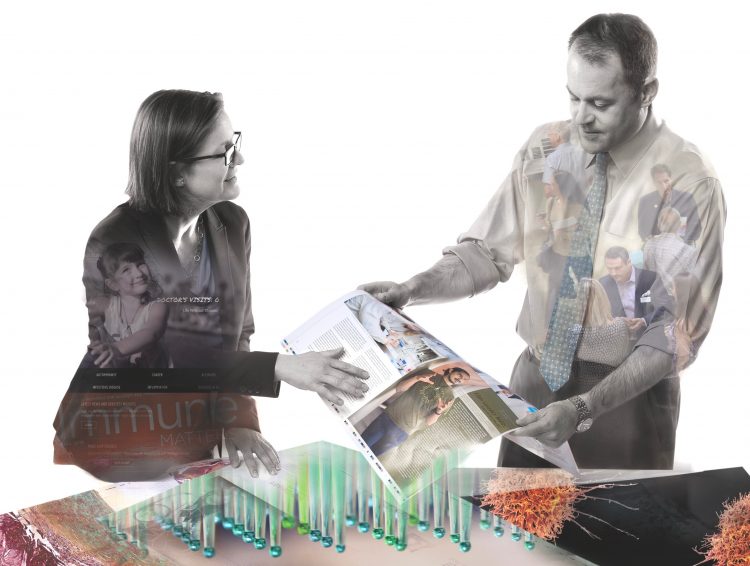
Gina Kirchweger, Ph.D.
Chief Communications Officer
It wasn’t until after Gina Kirchweger earned a Ph.D. in biochemistry at the University of Vienna and worked as a scientist for a number of years that she realized she had missed her calling. Fortunately for her and La Jolla Institute, she didn’t miss it by much.
“I’m lucky because I discovered my true passion was actually writing about science and sharing with the world the discoveries that come out of the amazing work of talented researchers like we have here at the Institute,” says Dr. Kirchweger, who joined the organization as Chief Communications Officer in 2015.
Once Dr. Kirchweger made the decision to take a different path in the late 1990s, she enrolled in the Science Communication program at the University of California, Santa Cruz, and then launched her second career by working as a foreign science correspondent for European newspapers and magazines for a number of years. She then shifted to working in-house, leading the science communications teams at prestigious scientific organizations such as the Salk Institute for Biological Studies in La Jolla and the Stowers Institute for Medical Research in Kansas City, Mo.
Over the last two years, Dr. Kirchweger has had a significant impact on the substance and quantity of the communications coming out of the Institute. Her credibility as a trained scientist and talent as a communicator have helped her gain the confidence of scientists throughout the Institute. They’re impressed with her ability to translate the most technical and difficult-to-comprehend research into plain, understandable English accessible to all audiences, but especially those in the general public who have little or no science background.
What makes Dr. Kirchweger so valuable to the Institute is that she isn’t just a science writer, she is a communications force. She and her colleagues have built the equivalent of an entire communications agency that utilizes a wide variety of tactics to share the Institute’s work and achievements. Among her many duties, Kirchweger writes and distributes press releases; handles media relations and works with reporters covering the Institute; serves as editor and writer for Immune Matters magazine; manages LJI’s website, including overseeing its re-design last year; writes fundraising brochures; develops communications strategic plans; polishes the visuals on presentations given to lay audiences and just recently helped develop the Institute’s first mobile app.
“I love that I still have a foot in science but get to use all of my creativity,” she says. “To me it’s all about communicating the excitement and critical nature of immune system research. I’m thrilled we have such a fantastic story to tell about the groundbreaking science here and how it affects every aspect of human health. Our scientists’ research here has always been recognized and admired within the scientific community, but awareness of their work is reaching a wider audience regionally and nationally. My ultimate goal is that someday anyone who thinks of immune system research thinks first of La Jolla Institute.”
Chris Lee, MBA
Chief Advancement Officer
In a recent meeting, a potential donor suddenly looked Chris Lee in the eye and asked, “If La Jolla Institute is so successful in attracting highly competitive federal government research funding, why do you need a contribution from me?”
It is a question Chris Lee hears often in his job as Chief Advancement Officer, and it’s one he’s always eager to answer as the person primarily responsible for raising philanthropic support for the Institute from private sources. “I really enjoy letting people know that while the Institute thankfully has stable core funding based on the strength of our work, as a donor they have a tremendous opportunity to significantly grow the Institute’s research on the immune system,” says Lee. “I love seeing them get excited about the idea of their philanthropy helping our scientists make those pivotal discoveries that change people’s lives.”
Lee, who graduated with a bachelor’s degree in political science from West Virginia University and an MBA in marketing from Villanova University, started his career as a staffer on Capitol Hill. Today, he is a 20-year development veteran with experience at top-level scientific organizations. Although he has only been on board at the Institute since last fall, he has already gained the confidence of many organizational stakeholders through a genial style and almost charismatic ability to capture the imagination of donors and encourage them to manifest their deep commitment to helping others by supporting the Institute financially.
“Philanthropic dollars are like an injection of accelerant because they often allow our researchers to dramatically expand their scientific vision and capabilities to complement the research they can achieve with competitive grants,” Lee says. “That outside money can be used to spark unusual and innovative research that can’t yet be funded with a grant, it can pay for recruiting the brightest and best postdocs and technicians, and it can fund the purchase of the most technologically advanced equipment and facilities.”
Lee and his team are succeeding in attracting more donors because they have a true passion for the Institute and its mission and a laser-sharp focus on the message they want
to impart to donors.
“In raising awareness of La Jolla Institute and bringing in as many private philanthropic dollars as we can for our scientists, we want people to know three things: who we are, what we do, and why it matters,” Lee says. “It’s crucial they know we are proudly and singularly focused on studying the immune system and the role it plays in virtually all disease. And that contributing to our work is one of the best scientific investments they will ever make, and finally, that the payoff, especially if they’ve had family or friends suffer from disease, is the chance to contribute to a process that has the very real potential to transform human health.”
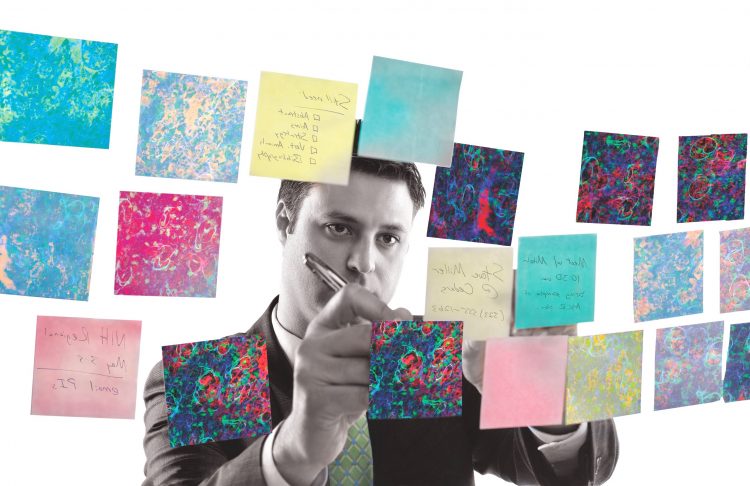
Brandon Fabritzky, CRA
Senior Manager, Office of Sponsored Research
Late last year, Sara McArdle, Ph.D., was getting excited about applying for a grant she hoped would enable La Jolla Institute to purchase a sophisticated laser scanning research micro-scope. That was until she opened the necessary forms to complete the grant application.
“It was more than 150 pages long, had five pages alone of confusing rules, and required accompanying letters from 20 scientists around the building,” says Dr. McArdle, a microscopy specialist in the Institute’s Microscopy Core. “If I had been working anywhere else but the Institute, I wouldn’t have even tried to complete the application.”
Yet Dr. McArdle wasn’t at all concerned because she knew she had a huge advantage: the Institute’s Office of Sponsored Research. She contacted and received immediate assistance from one of the members of Senior Manager Brandon Fabritzky’s veteran staff, among the most talented and dedicated grant assistance teams on the Torrey Pines Mesa.
“I remember showing the application to Maya Sarinana in the department and she wasn’t intimidated at all,” Dr. McArdle recalls. “She went right to work, and over a period of a few weeks made sure everything was collected and put in its proper place with the right format. We even had a glitch
on deadline day, but she came up with a solution and we submitted the application with only five minutes to spare.
By contrast, most places I’ve worked in the past offered me almost no assistance at all.”
Dr. McArdle’s praise is echoed by virtually all of the scientists at the Institute who receive similar assistance from Fabritzky’s team in submitting upwards of 130 grant applications a year, mostly to the National Institutes of Health, from which the Institute receives about 70 percent of its annual funding. LJI has one of the higher success rates in attracting NIH funding, which is why Fabritzky can’t understand why other institutions don’t invest the same kind of resources and effort that the Institute does.
“With grant funding being one of the vital lifelines of our Institute, we know just how important every one of them is to the health of our organization,” Fabritzky says. “That’s why my team and I always go the extra mile, handling every application with the utmost care—down to the smallest detail—while making every effort right to the very last minute before a deadline to support our scientists to make sure their entire application is the best it can possibly be.”
Fabritzky and his team are always excited when news of a grant award is received. “We feel very much like LJI’s maternity ward,” Fabritzky says with a smile. “We’re thrilled to play a role in helping deliver a service that is so critical to our researchers’ ability to fund great science.”
